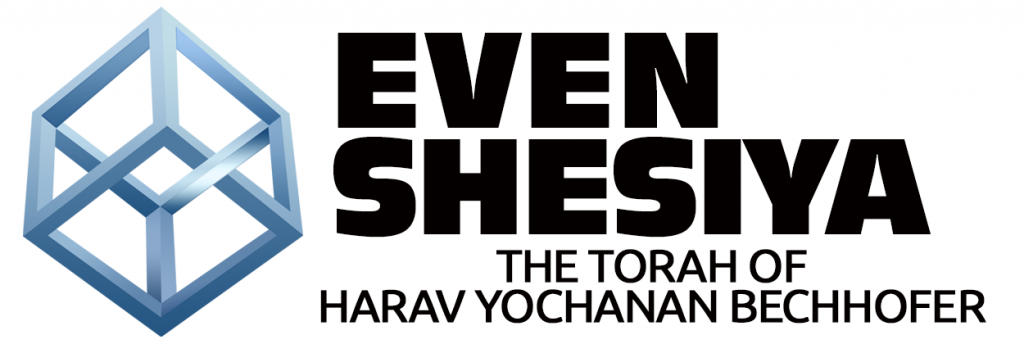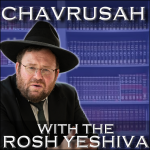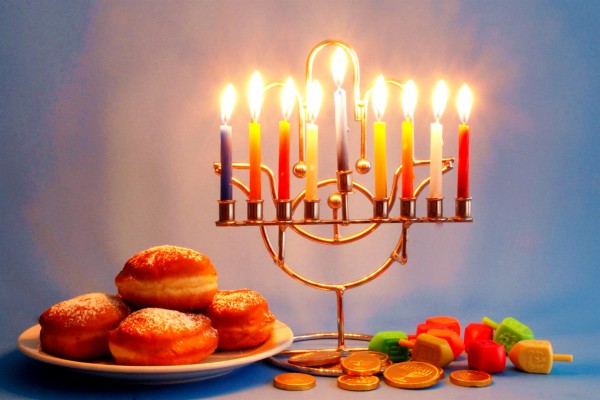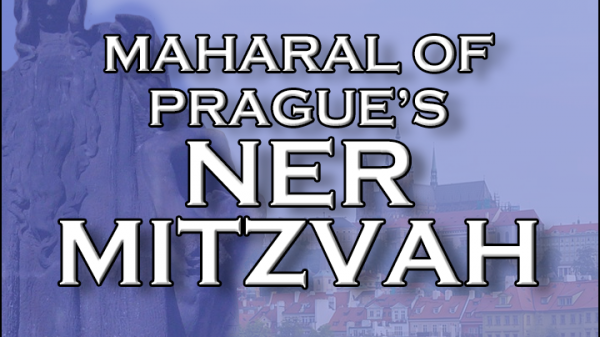Click here to download PDF
Special edition marking the conclusion
of Kaddish for my Mother Z” L

Meat
In this week’s Parsha we learn about a drastic change in our personal lives that will go into effect in the land of Israel. In the desert, the kosher animals that can be brought as a “korban Shelamim” had to be brought as such – whenever you wanted to eat that type of meat (Vayikra 17:1-7). Failure to do so when slaughtering that type of meat would be considered like “murder” and would carry the penalty of “Kareis”. The Pasuk in our Parsha (12:20) reads as follows: “When Hashem expands your borders as He told you and you will say ‘I shall eat meat’ as your soul will desire to eat meat as you fully desire you will eat meat”. This passage is long and complicated. What’s most glaring is that there is an overemphasis on man’s desire to eat meat! What is this over-emphasis on men’s desire to eat meat? Is the Torah endorsing gluttony? This is obviously cannot be, if so, what does the Torah mean to say? What’s even more difficult is that seemingly the same was true in the desert. It is not mandatory to bring a “Korban Shelamim”, it is a voluntary sacrifice that a person takes upon himself voluntarily. In the desert it was also true that a person only offered the “Shelamim” if he desired to eat meat, so what changed?
What Borders?
Another difficulty with the passage is understanding the term “when Hashem will expand your borders”. what does that have to do with anything? Rashi was clearly bothered by this question and he puts a spin on it to mean in the person’s own financial situation. The Torah is teaching you not to eat meat unless you can really afford it. This lesson is taught by Chazal. However, the pasuk is using the exact same terminology as when talking about territorial expansion throughout the whole Chumash as per next week’s parsha (19:8-9) “When Hashem will expand your borders….” we are at to add three more shelter cities for the unintentional murderer. How can we understand these words of “expand your borders” more literally in the context of this Pasuk in our parsha?
Appetite for War
This pasuk rings very similar to a famous Gemara in Brachos that discusses the situation on a national level. Daybreak comes and the elders of Israel walk into Dovid HaMelech and bring to his attention that the Jewish people need more livelihood. Dovid HaMelech responds that they should do more commerce amongst themselves. The elders make two arguments as to why that would not work: There is already a terrible deficit that is impossible to fill and the little bits that they can produce amongst themselves is not sufficient to fill their needs – or in their words: “the fistful of food can not satisfy the lion” Dovid HaMelech responds that the only solution would be to have a “Milchemes Reshus” -a voluntary war of territorial expansion. The solution was to conquer and expand the borders of the land to satisfy the “appetite” of the Jewish economy. We have the juxtaposition of the “Jewish appetite” and the “expansion of borders”- is there a real connection here?
Spare Space
Another question to raise is whether territorial expansion is absolutely necessary? We know from the gemara in Gittin that Tur Malka contained an astronomical number of inhabitants. The Gemara cites that one of the amoriam visited the area and said it would not even hold 600,000 reads. The Gemara explained that the land of Israel miraculously expands when it is inhabited by the Jewish people and that’s why it’s called “Eretz haTzvi” – the land of the deer: .just like the deer when it is alive its skin miraculously encompasses has its body but if you would skin it that you would never be able to wrap the skin around its body– so also land of Israel when its inhabitants are upon it it’s called that the land is alive and its borders can miraculously hold unlimited amount of people. This miracle was perpetual in the Temple whether it’s the people standing crowded but finding it’s spacious when they sprawled out to bow down, or in the “Kodesh HaKodashim” the “Aron” miraculously did not take up space. That being the case, is territorial expansion really ever necessary? One could make the argument that if we are virtuous, we will have these miracles happen to us and territorial expansion would never be necessary, but this is not the case! As per the pasuk we reference before ”when Hashem will expand your borders…..” we are to add three more shelter cities, Rashi says that that territorial expansion must happen because it was promised to us! We are to inherit the lands of the Keiney, kenesy and kadmony. The Rambam takes it a step further and cites that Pasuk as proof that Moshiach is an idea already taught by the Chumash because territorial expansion this has never happened yet, and this is proof that there must be a Moshiach that will lead that campaign of territorial expansion. Therefore, anyone who denies Moshiach is denying not just the words of the prophets but also the words of the Chumash. But why is this necessary? When Moshiach comes he will lead us with Justice and cause us to be virtuous and territorial expansion should not necessary as the limited borders of the land of Israel could contain unlimited amount of Jewish people. We see that expanding your borders is inevitable, but why?
There is a very important inference to make in all these Pesukim: “when Hashem will expand your borders….” – the borders belonging to the people. Even though the land of Israel belongs to Hashem (as does the whole world) Hashem is not saying “expanding the borders of my land” or “expanding the borders of the land” – rather “expanding your borders” what is the significance of this interesting inference?
Desert Space
Amongst the many differences between our situation in the desert and our situation land of Israel is that in the desert, which is not habitable space, it cannot be said that we had our own space. We were living in artificial space that was totally Divine in nature. It was a supernatural existence as man cannot survive in the desert. We were surrounded by the confines of the clouds had the “mann” and the miraculous well with the Mishkan with the revealed Divine presence at center of our encampment. We were living in “Hashem’s space”. Living in this supernatural space is reason enough why many mitzvahs did not go into effect until we entered the land of Israel, we were not in a place where mitzvahs are needed or make a difference. Mitzvahs are (as we’ve explained many times in the past) to fix the natural world and “pull the pieces together” and we were not living in “natural reality” while we were in the desert. Asides for not needing to go to work and engage in earthly pursuits in order to survive, even our eating and drinking was not done on our own terms. We were always eating at “the table of the King” on His terms, in His place. This was expressed by the fact that the animals that could be brought as a “Korban Shelamim” could only be consumed on that basis. Even though these Korbanos are voluntary, but it’s not a full fulfillment of your desire and doing things in your space on your terms. It had to be done in His space in the area where one can eat “kodshim” and had to be done as a sacrifice to Him. Even if entering the situation was voluntary but everything was on Hashem’s terms and on His Turf.
Getting our Turf
With Hashem giving us the land of Israel where we would live a natural life, He was also giving us our own borders of our own turf. The desire to eat meat is a metaphor for all human ambitions, be it to acquire and absorb, be it to create. When living in the desert on Hashem’s turf, the individual ambition which is just as natural as having a body, emotions and a brain was unfulfilled. On the surface, this may seem like a step down, which is indeed one of the many thoughts that passed through the minds of the spies when they slandered the land of Israel and were against moving there. However, just like Hashem put a Neshama in a body to elevate it, so also the whole world of the body needs to be elevated. We are to engage in earthly pursuits and fulfill all our ambitions within the parameters of Halacha and with a sense of mission that it is part of our mission for which Hashem sent our souls to earth. The outcome of this mission is to merge the earthly realm with the kingdom of Heaven.
Matching or Anulling?
With this we can understand a cryptic Mishna in Avos which says, (Chapter 2, Mishna 4) “Make his will like your will so He should make your will like His will. Annul your will before His will, so He should annul the will of others in favor of your will”. It seems that there is a contradiction between the first statement and the second statement. The first statement talks about seeking to reconcile our will with Hashem’s will and He will respond by reconciling His will to ours. But then in the second statement it is saying that we should simply annul our will in favor of His will altogether. The Mishna is saying as follows: the ideal first course of action is for man to have a will of his own that he reconciles with Hashem’s will because man’s mission is to elevate the earthly will and pursuits with the Heavenly will. That is the mission for which the Neshama came to earth. However, the Mishna in the second statement is warning us that when the reconciliation is impossible, we are to annul our will in favor of His and Hashem will greatly appreciate that sacrifice, that was necessary under the circumstances, and reward us by annulling the wills of others that are in opposition to our will.
Israel vs Chutz L’Aretz
Not all places on earth are equal in making this reconciliation and unification. Earthly pursuits most often are a distraction from Heavenly pursuits and in many cases, are downright detrimental to anything spiritual. Only when the Jewish people are in the Holy land of Israel, can they be engaged in the earthly and successfully connected to the Heavenly. It is truly our borders where we have our turf that Hashem gave us and in turn, we give it back to Hashem by conquering earth for the sake of the Kingdom of Heaven. The reconciliation that only happens in the land of Israel (or with the power of the holiness of the land of Israel as we will explain) has a ripple effect on the rest of the globe. When the Jewish people control the earthly in the land of Israel, the whole globe will feel and acknowledge the Kingdom of Heaven.
The Desert Kollel
The Nefesh HaChaim references the famous ‘Machlokes’ between Rav Shimon Bar Yochai and Rabi Yishmael whether a person should only learn Torah and trust that all his earthly needs will be seen to by others, or in a miraculous way, as opposed to the opinion of Rabi Yishmael who says one should combine, Torah study being dominant with being engaged in the earthly pursuits that make a living. The Nefesh HaChaim points out that in the generation of the desert everyone did like Rav Shimon Bar Yochai because they did not have to go to work and they were in this exceptional state of extreme closeness to Hashem and that’s why the “Cherubim” in that generation were constructed perfectly facing each other which reflected their situation of being perfectly aligned with Hashem’s Will because they had no pursuits of their own whatsoever. That was undoubtedly the ideal situation with which to give the Torah as that generation would have absolutely nothing else on their minds. The Nefesh HaChaim contrasts that with the situation days of Shlomo HaMelech when we were living in the land of Israel and engaged in the pursuit of livelihood and that’s why the “Cherubim” were made on a ‘slant’ because our attention was divided between serving Hashem and learning His Torah and being engaged, even if just on a secondary basis, in earthly pursuits in order to make a living. This ‘slant’ of the “Cherubim” represents seeking a reconciliation between our will and Hashem’s Will.
Workplace
What supplements the Nefesh HaChaim’s observation is an idea attributed to the Chasam Sofer that that which Rabi Yishmael who said that man should be engaged in earthly pursuits on a secondary basis, which is the preferred path for the majority of people, is only in the land of Israel where we can Merit to engage in earthly pursuits and still be connected to the Divine. Only in Israel will be the tremendous cosmic merger between the natural and the supernatural but in exile, outside the land of Israel, he would indeed agree with Rav Shimon Bar Yochai not to engage in earthly pursuits as it would only be a distraction. The land of Israel is where earthly pursuits are part of a tremendous cosmic unity between the natural and supernatural and could be considered a mitzvah. Outside of Israel we must only “annul our will before His Will….”
Jewish Arts & Sciences
On an occasion when I had a private discussion with my Rebbe Maran HaGaon HaRav Yaakov Weinberg ZT”L the Rosh Yeshiva of Ner Yisroel regarding secular pursuits in general and the sciences in particular he told me that he saw in sifrei Kabbalah that part of the setbacks caused by “Shechinta b’Galusa” – the Divine Presence in exile is that the Jewish people do not dominate absolutely the field of the sciences and all other worthwhile human achievement. Ideally the Jewish people should be the greatest and monopolize all the sciences. This implies that when we are in the land of Israel and the Divine Presence is fully restored to its rightful in the land of Israel the Jewish people will be the absolute leaders in scientific advancement and all worthwhile human achievement. Only in the land of Israel will the Jewish people attain the Pinnacle of human achievement and merge it with Divinity. This “Tikun” cannot be made outside of the land of Israel. As a result of the disruption of “Golus” the gentiles could seize the ‘loose Sparks’ and dominate the field of the sciences and other worthwhile arts and achievements, for the time being.
Natural Space vs Supernatural Space
With giving us the land of Israel hashem granted us our own space, our own borders, our own turf which we must elevate and sanctify. This is true of the “natural space” that Hashem gave us. The supernatural space that opens in the Temple or when the Jewish people are in land of Israel is “Hashem’s space” like the space that there was in the desert. It is safe to assume that in this supernatural space that opens under special circumstances no unintentional manslaughter or any other mishaps would happen there. It is not the natural space that we elevate in the merit of the land of Israel. That’s why it is likened to the deer when it’s alive when it has its life force in – a power of soul not a power of body. The natural space that we have is” body space” that were meant to connect to Divinity. “Milchemes Reshus”-a voluntary war which can be read as ‘war of turf’ as “Reshus” means domain, we expand our territory and here it goes in reverse order to what Hashem did for us initially. Hashem gave us Holy land to be ours – but when we conquer land we expand our borders and then they become sanctified with the sanctity of the land of Israel! We’re giving land back to Hashem by first by making it our own. In our territorial expansion will we have to add shelter cities for the mishaps that are prone to happen in the course of human events….
National Appetite
Just like we were granted our own space to have a sense of feeling of self-fulfillment of our desires and aspirations and that is all referred to as “appetite and desire” as it’s not just talking about desire for meat but rather a metaphor for all human aspirations. So also on a national level the Jewish people are granted an insatiable economic appetite to prompt us to want to consume and conquer more lands because territorial expansion of the Jewish people is to elevate the natural world by annexing it to the Jewish kingdom which ultimately gets grafted onto the kingdom of Heaven and a tremendous cosmic unity between the natural and supernatural is achieved.
Elul – Chiseling a Heart of Stone into Luchos HaBris
The ‘Tikun’ of leading a natural life in the land of Israel which causes nature to be grafted onto the supernatural is also within the individual himself. Why did Moshe have to go up to Heaven again for another 40 days and 40 nights to receive the second Luchos? He learnt it all the total already! It should have been a one-day trip on erev Yom Kippur returning on Yom Kippur! Why was it necessary to go up for the whole month of Elul which are called “Yemei Ratzon” – days of will? The Tikun of Elul is to “align our will with His Will” like what is meant to be attained in the land of Israel. The tablets of stone that Moshe had to bring up with him it alludes to the human heart. We have a heart of Stone that must be chiseled into the form of tablets that carry Hashem’s law that is called to unite our heart which is our will with the Divine will and that is what required another 40 days and 40 nights. Because of the sin of the golden calf we got detached from the Divine will. The first Luchos which were Divine in nature represented that our hearts only desired what Hashem desires, and that was natural for us at the time. Now we must “make our will like His Will” and that is the carving of the stone into the Luchos painstakingly engraved with the Divine writing. That’s the process of Elul – the carving of the heart of Stone into Luchos that our hearts should desire the same thing that he desires “Ani l’Dodi v’Dodi li” – our will should run perfectly parallel to His Will and that way we can sincerely accept Hashem as our king after we’ve aligned our desires and aspirations to be perfectly parallel to His Will and His Law.











